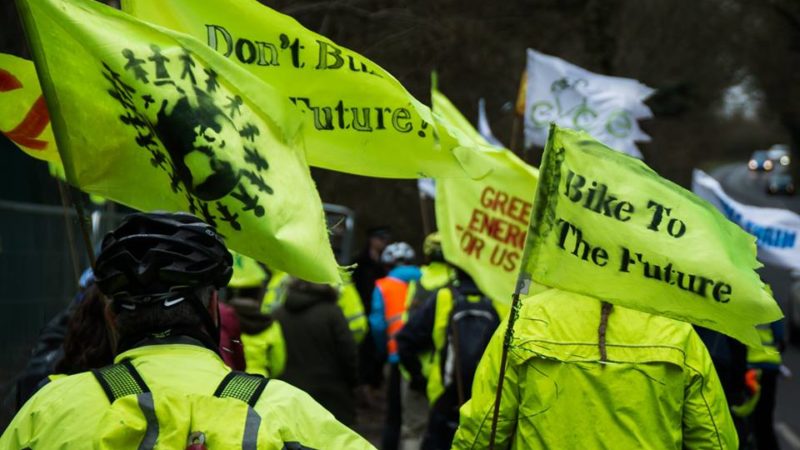The push for shale gas is still strong - but campaigners are riding to 'reclaim the power'.

On June 23, cyclists from across the south east will come together for ‘Le Tour de Frack’ – with hundreds riding to raise awareness of the threat of onshore oil exploration.
The reasons for stopping fracking are clear: expansion of the onshore unconventional oil industry would mean ecocide and pollution to our water, air and land. Energy companies would need to drill many wells back to back to make their ventures commercially viable.
All this would result in huge increases in traffic, noise and disruption and a corresponding decrease in property values. Farmland and woodland would be sacrificed and rural areas would be industrialised. Exploiting these hard to get fossil fuel reserves is not consistent with our commitments to decarbonise and commits us to runaway climate change.
The industry and government want people to think that this is conventional oil exploration. Yet here’s how it work: they are seeking to exploit tight oil in low permeable rock and shale formations, which requires techniques like fracking and acidisation (both acid stimulation and matrix acidising) to dissolve and break apart the rock and stimulate oil flows.
In the USA, the shale gas boom and bust cycle has resembled a Ponzi scheme. Hydrocarbon reserves are over-hyped, investors are drawn in and share price inflation is used to justify over-optimistic company valuations and large executive salaries.
Many of the smaller companies have gone bankrupt with net losses in excess of 50 billion dollars over the past decade. Three of these wildcat oil companies, UK Oil and Gas (UKOG), Europa Oil and Gas and Angus Energy, are listed on the Alternative Investment Market (AIM), a poorly regulated platform where a number of high profile insider trading scams have been perpetuated.
The Horse Hill well in Surrey, first drilled in 2014, has been the subject of much industry hype, being labelled the “Gatwick Gusher” in 2015 after initial flow tests. UKOG claimed there could be up to 100 billion barrels under the Weald, a preposterous estimate that exceeds North Sea oil production.
A new report by the Xodus consultancy estimates that UKOG’s potential reserves are much less at 21 million barrels, with only 85 thousand barrels having actually been produced via the existing site at Horndean.
The Horse Hill site was occupied in December 2017 by protectors who sought to “raise awareness of climate change, air and water pollution and industrialisation of the countryside”. UKOG now have planning permission to drill and flow test a sidetrack plus a new vertical well and extended flow tests of their original well.
Work is expected to start in July and shareholders are reportedly anxious for news. The company recently announced they are seeking £5 million in further funding and there are suggestions they are struggling for funds.
Resistance to the onshore hydrocarbon industry in Surrey centres on Leith Hill Protection Camp, situated at Surrey’s highest point. Here Europa intend to drill for oil in the Surrey Hills Area of Outstanding Natural Beauty, a cherished recreational area popular with cyclists, walkers and horse riders.
Forests play a vital role as carbon sinks, in purifying water and provide a haven for wildlife. And the land is managed by the Forestry Commission, who claim to have a duty to “protect and expand forests”.
Leith Hill Action Group have been fighting Europa’s plans for over nine years and both the traffic management plan and the Environment Agency permits are still to be approved.
It’s no surprise that vehicular access has been a sticking point with Surrey County Council. Haulage vehicles would access the site via a historic sunken lane, which is too narrow for a lorry and a second vehicle to pass each other in many places.
In 2013, the village of Balcombe attracted huge protests to oppose Cuadrilla’s plans to drill for oil. An exploratory well was drilled but the company were unable to complete their testing in the permitted time frame and had to apply for new permits.
In January 2018, Angus Energy announced it had bought a 25% share of the licence and has recently been approved by the Oil and Gas Authority as the site operator. There is still an outstanding Environment Agency permit to store oil at the site but Angus claim they expect to flow test the Balcombe horizontal well sometime between July and September this year.
Angus Energy also own the site at Brockham near Dorking, an old conventional oil well, where
a sidetrack, was illegally drilled in January 2017 without planning permission from Surrey County Council.
An ongoing planning dispute between the company and the council continues and a retrospective planning application will now be decided on July 11.
Starting in Dorking, we will be touring drill sites across Surrey and Sussex: Horse Hill, Brockham, Balcombe and Leith Hill.
We are cycling to protect the land that nourishes us – and to preserve the rural way of life.
Al Williams is an activist with Reclaim the Power.
See here for more details on Le Tour de Frack and how to sign up.
To reach hundreds of thousands of new readers we need to grow our donor base substantially.
That's why in 2024, we are seeking to generate 150 additional regular donors to support Left Foot Forward's work.
We still need another 117 people to donate to hit the target. You can help. Donate today.



